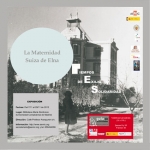CALL FOR PAPERS Remembering in a Globalizing World: The Play and Interplay of Tourism, Memory, and Place
CALL FOR PAPERS
Remembering in a Globalizing World: The Play and Interplay of Tourism, Memory, and Place
Date: September 8-10, 2014
Place: Le Chambon sur Lignon, France
CALL FOR PAPERS
Remembering in a Globalizing World: The Play and Interplay of Tourism, Memory, and Place
Date: September 8-10, 2014
Place: Le Chambon sur Lignon, France
Official Partners: University of Cergy-Pontoise (France), Amar Singh College, University of Kashmir (India), University of Paris Panthéon-Sorbonne (France), NHTV Breda University of Applied Sciences (Netherland), University of Laval (Canada), University of Trois Rivières (Canada)
DEADLINE for long abstracts: All abstracts should be written in English and must not exceed 1000 words in length. Abstracts should be sent to hertzog.anne@wanadoo.fr and tourismemory@gmail.com before 30 November 2013, and must include: author(s), affiliation(s), a summary of the research aims, approach and key arguments/findings, and the mode of the presentation.
For more information:
CALL FOR PAPERS
International Conference:
Things to Remember: Materializing Memories in Art and Popular Culture
Dates: June 5-6, 2014
Place: Radboud University Nijmegen (The Netherlands)
Deadline for paper proposals: January 7, 2014
Memory matters. It matters because memory brings the past into the present, and opens it up to the future. But it also matters literally, because memory is mediated materially. Materiality is the stuff of memory. Meaningful objects that we love (or hate) function not only as aide-mémoire but as memory itself.
The international conference Things to Remember: Materializing Memories aims to explore a sustained focus on the materiality in and of memory. Such a focus helps to understand memory as a vibrant process, by analysing the active, creative and popular forms of remembering and forgetting. At the same time a materialist focus entails recognising certain forms of agency in material objects. As Bill Brown argues, a culture constitutes itself through its inanimate objects: ‘culture as it is objectified in material forms’. In this conference we want to draw cultural memory into the discourse of ‘new materialism’, inquiring how we remember with and through things. Here we avoid simple dualisms by foregrounding the intersections between the material and immaterial, natural and cultural, living or inert. Things make us remember (and forget), yet we also use things to bring about remembrance or forgetfulness. We therefore argue that memory is both mental and material.
The conference foregrounds the materiality of memory by investigating the vital relations between past and present, absence and presence, and remembrance and object. We thus interrogate the material transfers through which cultural memories of the past are expressed and circulated in art, media and popular culture. These transfers produce, re-present and transform mediated memories, literally giving shape to them in words, images, and objects. The conference pays as much attention to how we remember, create and re-create memories as to what we remember. Cultural memory is taken as both an active process and a dynamic practice. In such processes and practices of remembering, objects and things are endowed with meaning, agency and affect. As Bergson put it poetically, recollection is like ‘a fold in a material’. This raises the question how cultural memory plays a role in the social and cultural life of objects. Or, vice versa, what is the role that material things and objects play in ‘doing’ memory? That role will entail a study of the interaction between the materiality of memory, its affective nature, and its ideological frameworks. The conference will explore how memory unfolds time in its objectified materializations, both looking forwards and backwards, and realizing the affective dimensions of the here and now.
This conference will be centred on the following questions: What kind of memory-work do objects do? How does materiality mediate memory, for the individual and for society? What is the role of memory and forgetting in the social and cultural life of objects? Or vice versa, what is the role that material things and objects play in constructing memories? How do art objects and practices bring the past in the present? And how do they open up possibilities for a different future? How is the object endowed with meaning, affect and agency through the recollections attached to it?
We are particularly interested in: analyses of what is at stake in the complex processes of remembering and forgetting, of recollecting and disremembering, of amnesia and anamnesis that make up cultural memory; studies of how memory, object and affect are contingent on one another in their relation to time, both looking forwards and backwards; and explorations of how art and popular culture, in producing material memories, may produce a relevant experience for the spectator, visitor, listener or reader.
The conference aims at covering a wide range of artistic disciplines: fine arts, architecture, literature, music, cinema, theatre, digital media and fashion. We welcome proposals for papers as well as for three-paper panels.
Possible topics can include but are not limited to:
Thing-memory
Art as a memory trigger
Literary and artistic interventions in cultural forgetting
Consumer culture as planned obsolescence
The consumption of the past in contemporary fashion
Remembering forgotten writers and artists
The production of presence and absence
The persistence of the historical past
Theories of matter, thing, and object
Trauma and materiality
Discarded and recycled objects
Souvenirs, gifts, kitsch objects
Toys, models, and miniature objects as things of memory
Ruins and material remains of the past
Our previous successful conferences resulted in two book publications:
Technologies of Memory in the Arts, edited by L. Plate & A. Smelik (Palgrave/Macmillan, 2009).
Performing Memory in Art and Popular Culture, edited by L. Plate & A. Smelik (Routledge, 2013).
Please submit your proposal for a 20-minute paper; or for a panel session of three papers through the conference website: http://www.ru.nl/hlcs/programma’s/things-to-remember/things-to-remember/
Conference committee
Marguérite Corporaal, László Munteán, Vincent Meelberg, Liedeke Plate, Anneke Smelik, Lianne Toussaint, Wouter Weijers
Contact information
e-mailadres: thingstoremember@let.ru.nl

